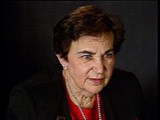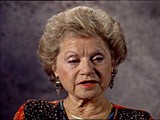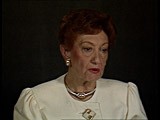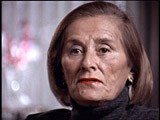<< Previous | Displaying results 51-60 of 571 for "" | Next >>
-
Norbert J. Yasharoff describes the change in living conditions for Jews in Bulgaria
Oral HistoryAnti-Jewish measures took effect in Bulgaria after the beginning of World War II. In March 1941, Bulgaria joined the Axis alliance and German troops passed through Sofia. In May 1943, Norbert and his family were expelled to Plevin in northern Bulgaria, where they stayed with relatives. After the advance of the Soviet army in 1944, Norbert and his family returned to Sofia.

-
Siegfried Halbreich describes arrival at and brutality in the Gross-Rosen camp
Oral HistoryAfter Germany invaded Poland on September 1, 1939, Siegfried fled with a friend. They attempted to get papers allowing them to go to France, but were turned over to the Germans. Siegfried was jailed, taken to Berlin, and then transported to the Sachsenhausen camp near Berlin in October 1939. He was among the first Polish Jews imprisoned in Sachsenhausen. Inmates were mistreated and made to carry out forced labor. After two years, Siegfried was deported to the Gross-Rosen concentration camp, where he was…

-
David (Dudi) Bergman describes a roll call "violation" incident in the Reichenbach subcamp of Gross-Rosen
Oral HistoryThe Germans occupied David's town, previously annexed by Hungary, in 1944. David was deported to Auschwitz and, with his father, transported to Plaszow. David was sent to the Gross-Rosen camp and to Reichenbach. He was then among three of 150 in a cattle car who survived transportation to Dachau. He was liberated after a death march from Innsbruck toward the front line of combat between US and German troops.

-
Hana Mueller Bruml describes forced labor at Sackisch, a subcamp of Gross-Rosen
Oral HistoryIn 1942, Hana was confined with other Jews to the Theresienstadt ghetto, where she worked as a nurse. There, amid epidemics and poverty, residents held operas, debates, and poetry readings. In 1944, she was deported to Auschwitz. After a month there, she was sent to Sackisch, a Gross-Rosen subcamp, where she made airplane parts at forced labor. She was liberated in May 1945.

-
Ivo Herzer describes conditions in the camp in Italian-occupied Yugoslavia to which he was taken in November 1942
Oral HistoryIvo grew up in a middle-class Jewish family in Zagreb. He experienced little overt antisemitism until the Germans and their allies invaded Yugoslavia in April 1941 and installed a fascist Ustasa government in Croatia. The Ustasa regime began killing Jews, Serbs, and Roma (Gypsies). Ivo's family escaped to Italian-occupied territory, where the Italians tried to protect Jewish refugees. Ivo lived in Italian internment camps, including the Rab island camp, before moving to mainland Italy in 1944. He worked…

-
Isaac (Mike) Danon describes conditions in Yugoslavia and Italian occupation forces there
Oral HistoryIsaac lived with his parents and three sisters in Split, on the Dalmatian coast of Yugoslavia. When German and Axis forces invaded and partitioned Yugoslavia in 1941, Italian forces occupied Split along with other coastal areas of Yugoslavia. Italian occupation authorities in Yugoslavia generally prevented violent attacks on Jews. The Italian zone became a safe haven for those fleeing the Nazis or the Ustase (Croatian fascists). After Italy signed an armistice with the Allies in 1943, the area was occupied…

-
Flory (Floritza) Jagoda describes anti-Jewish measures following the occupation of Zagreb
Oral HistoryFlory was born into a Sephardic Jewish family. When Flory was a young girl, her mother moved to Zagreb with Flory's stepfather; Flory joined them after living with her grandmother for two years. In Zagreb, Flory took music lessons and learned how to play the accordion. Germany and its allies invaded Yugoslavia in April 1941, partitioning the country and establishing a fascist regime under the Ustase (pro-German Croatian nationalists) in Croatia. The Ustasa regime soon imposed anti-Jewish regulations in…

-
Madeline Deutsch describes ghettoization in Hungary
Oral HistoryMadeline was born into a middle class family in an area of Czechoslovakia that was annexed by Hungary in 1938-1939. Her father worked out of their home and her mother was a homemaker. Madeline attended high school. In April 1944 her family was forced into a Hungarian ghetto. The family lived in the ghetto for two weeks before being transported to Auschwitz. Madeline and her mother were separated from her father and older brother. Neither her father nor brother survived the war. A week after arriving in…

-
Madeline Deutsch describes the seizure of property following the German occupation of Hungary
Oral HistoryMadeline was born into a middle class family in an area of Czechoslovakia that was annexed by Hungary in 1938-1939. Her father worked out of their home and her mother was a homemaker. Madeline attended high school. In April 1944 her family was forced into a Hungarian ghetto. The family lived in the ghetto for two weeks before being transported to Auschwitz. Madeline and her mother were separated from her father and older brother. Neither her father nor brother survived the war. A week after arriving in…

-
Agate (Agi) Rubin describes events following the German occupation of Hungary
Oral HistoryIn April 1944, after the German occupation of Hungary, Agi, her mother, six-year-old brother, and aunt were forced into the Munkacs ghetto. Before deportation to Auschwitz, Agi was forced to work in the ghetto's brick factory. At Auschwitz, Agi, then 14 years old, was chosen as part of a Sonderkommando. This forced-labor detachment had to sort the clothing and possessions of inmates and victims at Auschwitz. In January 1945, Agi and other prisoners were forced on a death march from Auschwitz. She was…

